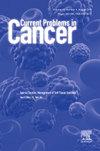MAGE-A3 as a target for cancer immunotherapy: A systematic review of clinical and preclinical evidence
IF 2.3
4区 医学
Q3 ONCOLOGY
引用次数: 0
Abstract
Background
MAGE-A3, a cancer-testis antigen, is a promising immunotherapeutic target due to its high expression in various malignancies and limited expression in normal tissues. However, clinical outcomes with MAGE-A3-based therapies have been inconsistent.
Purpose
This systematic review evaluates the effectiveness of MAGE-A3 immunotherapy in cancer by synthesizing clinical and in vitro evidence regarding efficacy, immunogenicity, safety, and predictive biomarkers.
Methods
The review was registered with PROSPERO (CRD42024577090). A comprehensive search was conducted in PubMed, MEDLINE, and Cochrane for articles published until February 8, 2024, supplemented by a manual review of bibliographies. Two independent reviewers followed PRISMA guidelines for study selection, data extraction, and quality assessment, including Risk of Bias evaluation using the ROBVIS tool.
Results
Ninety-three studies were included. Clinical investigations, mainly in melanoma and non-small-cell lung cancer (NSCLC), demonstrated that MAGE-A3 immunotherapy is generally safe and elicits antigen-specific immune responses. However, large phase III trials (e.g., MAGRIT, DERMA) failed to show significant improvements in disease-free or overall survival. A subset of studies identified predictive gene signatures correlating with better outcomes. In vitro studies provided mechanistic insights, revealing enhanced antigen expression through epigenetic modulation, improved dendritic cell-mediated antigen presentation, and promising results from advanced T-cell receptor engineering.
Conclusion
Although MAGE-A3 immunotherapy induces immune responses with a favorable safety profile, its clinical efficacy remains limited. Future strategies should focus on optimized patient selection via predictive biomarkers and combination therapies to enhance antitumor effectiveness.
MAGE-A3作为癌症免疫治疗的靶点:临床和临床前证据的系统综述
mage - a3是一种睾丸癌抗原,由于其在各种恶性肿瘤中高表达而在正常组织中表达有限,是一种很有前景的免疫治疗靶点。然而,基于mage - a3的治疗的临床结果并不一致。目的:本系统综述通过综合临床和体外证据,评价MAGE-A3免疫疗法在癌症治疗中的有效性,包括疗效、免疫原性、安全性和预测性生物标志物。方法本综述在PROSPERO注册(CRD42024577090)。我们在PubMed、MEDLINE和Cochrane中对2024年2月8日之前发表的文章进行了全面的搜索,并辅以对参考书目的人工审查。两名独立审稿人遵循PRISMA指南进行研究选择、数据提取和质量评估,包括使用ROBVIS工具进行偏倚风险评估。结果共纳入93项研究。主要针对黑色素瘤和非小细胞肺癌(NSCLC)的临床研究表明,MAGE-A3免疫疗法通常是安全的,并能引发抗原特异性免疫反应。然而,大型III期试验(例如,MAGRIT, DERMA)未能显示无病生存期或总生存期的显着改善。一部分研究确定了与更好的结果相关的预测性基因特征。体外研究提供了机制见解,揭示了通过表观遗传调节增强抗原表达,改善树突状细胞介导的抗原呈递,以及先进的t细胞受体工程带来的有希望的结果。结论MAGE-A3免疫疗法虽能诱导免疫应答,且具有良好的安全性,但其临床疗效仍然有限。未来的策略应侧重于通过预测性生物标志物和联合治疗来优化患者选择,以提高抗肿瘤效果。
本文章由计算机程序翻译,如有差异,请以英文原文为准。
求助全文
约1分钟内获得全文
求助全文
来源期刊

Current Problems in Cancer
医学-肿瘤学
CiteScore
5.10
自引率
0.00%
发文量
71
审稿时长
15 days
期刊介绍:
Current Problems in Cancer seeks to promote and disseminate innovative, transformative, and impactful data on patient-oriented cancer research and clinical care. Specifically, the journal''s scope is focused on reporting the results of well-designed cancer studies that influence/alter practice or identify new directions in clinical cancer research. These studies can include novel therapeutic approaches, new strategies for early diagnosis, cancer clinical trials, and supportive care, among others. Papers that focus solely on laboratory-based or basic science research are discouraged. The journal''s format also allows, on occasion, for a multi-faceted overview of a single topic via a curated selection of review articles, while also offering articles that present dynamic material that influences the oncology field.
 求助内容:
求助内容: 应助结果提醒方式:
应助结果提醒方式:


